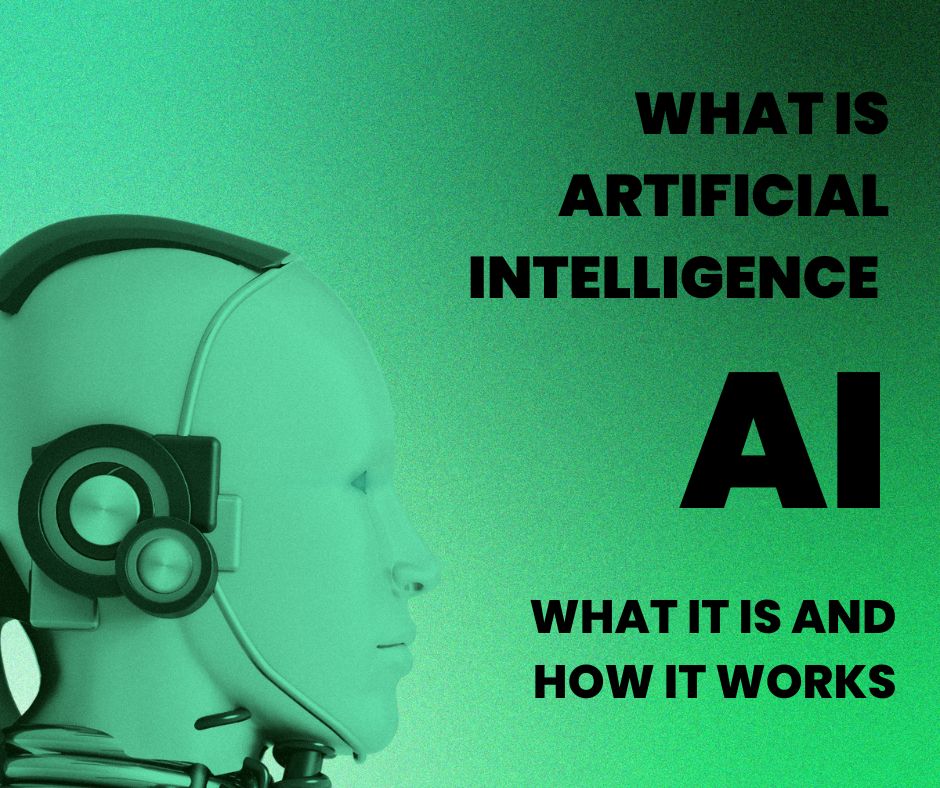Artificial Intelligence (AI) is a rapidly growing field that is revolutionizing the way computers are used to solve complex problems. AI has already been applied in many different areas, including robotics, natural language processing, computer vision and more. In this what is artificial intelligence article we will discuss what Artificial Intelligence is and how it can be used to benefit humanity.
Intelligence has been defined in many ways: the capacity for abstraction, logic, understanding, self-awareness, learning, emotional knowledge, reasoning, planning, creativity, critical thinking, and problem-solving. More generally, it can be described as the ability to perceive or infer information, and to retain it as knowledge to be applied towards adaptive behaviors within an environment or context.
Intelligence is most often studied in humans but has also been observed in both non-human animals and in plants despite controversy as to whether some of these forms of life exhibit intelligence.[1][2] Intelligence in computers or other machines is called artificial intelligence. – source https://en.wikipedia.org/wiki/Intelligence
The Origin of Artificial Intelligence
When looking to understand what is artificial intelligence we need to discover its origins. The concept of AI dates back to the 1950s when Alan Turing proposed a test for determining if a machine could think as intelligently as a human. Since then, AI has come a long way and now encompasses many different technologies such as machine learning, deep learning, natural language processing and more. AI allows machines to learn from data, identify patterns and make decisions without explicit programming instructions.
AI has the potential to significantly improve our lives and create new opportunities for humans. It can help with tasks such as predicting stock market movements or providing personalized medical advice. In addition, AI can be used to automate mundane tasks, freeing up human workers for more creative pursuits. This article will explore these possibilities and provide an overview of what Artificial Intelligence is capable of achieving.
Table of Contents
What Is Artificial Intelligence?
Artificial Intelligence (AI) is a form of technology that enables a computer system or machine to mimic the cognitive functions of humans. It is an ever-evolving field and has been around since the 1950s. AI can be used in various applications, from facial recognition to medical diagnosis and natural language processing. AI systems are designed to be able to handle complex tasks such as decision making, pattern recognition, and problem solving. AI has been used in many industries for decades and it continues to grow in popularity due to its potential for helping businesses improve operations and increase efficiency.
AI has been used in various areas, including robotics, image processing, natural language processing, voice recognition, facial recognition, machine learning, deep learning and more. AI technologies are also being applied in healthcare settings with the help of AI-enabled machines and robots performing various tasks such as diagnosing diseases and providing personalized treatments. By using artificial intelligence, businesses can gain insights into customer behavior and make more informed decisions about product development or marketing strategies. The use of AI could also lead to improved customer service experiences by providing more accurate customer support responses.
The potential for artificial intelligence is immense; however, its success depends on how it is implemented within a particular context. While the progress made so far is encouraging, there is still much work needed to ensure that these complex systems become reliable tools for businesses and consumers alike. As we look towards the future of artificial intelligence technology, it will be important to understand its history and origins in order to better appreciate its current capabilities as well as anticipate what may be possible in the years ahead.
The History Of Artificial Intelligence
Artificial Intelligence (AI) is a field of computer science that focuses on creating machines that can think and act like humans. Its history dates back to the 1950s, when Alan Turing wrote his seminal paper on the concept of AI. Since then, AI has grown in complexity and range of applications, from robotics for industrial processes to facial recognition for security systems.
It is important to note that the development of AI does not exist in a vacuum; instead, it relies heavily on the work done by mathematicians, philosophers, engineers and computer scientists since its inception. Here is a list of some key developments in AI’s history:
- In 1956, John McCarthy coined the term “artificial intelligence” at a Dartmouth College conference
- In 1966, Joseph Weizenbaum developed ELIZA, one of the first chatbots
- In 1997, IBM’s Deep Blue supercomputer defeated Garry Kasparov in chess
- In 2011, Watson won Jeopardy against two former champions
These milestones demonstrate how far AI technology has come over time; however there have been other advancements as well such as machine learning algorithms, natural language processing (NLP), and robotics which have been instrumental in furthering AI research. With all these advances combined with modern computing technology today’s AI systems are far more powerful than ever before and show no signs of stopping anytime soon. This leads us into an exploration of the different types of artificial intelligence available today.
Types Of Artificial Intelligence
Artificial Intelligence (AI) is an interdisciplinary field of study that focuses on the development and understanding of computer systems with the capability to act intelligently. AI has become a popular research topic due to its potential applications in many different areas, including healthcare, finance, education, and robotics. AI can be divided into two broad categories: symbolic AI and sub-symbolic AI.
Symbolic AI refers to the use of symbols or rules to represent facts and knowledge in order to solve problems. It uses algorithms to solve problems by making logical deductions from a set of known facts. This approach is often used for tasks such as natural language processing (NLP), machine learning, and computer vision. Sub-symbolic AI, on the other hand, involves using data-driven techniques such as neural networks and deep learning for problem solving. This approach is ideal for tasks that require more complex decision making or pattern recognition capabilities.
An important aspect of AI is its ability to evolve over time as new data becomes available. By incorporating this type of feedback loop, machines can learn from their mistakes and improve their own accuracy in performing various tasks. This makes it possible for them to adapt quickly to changing environments and provide more accurate results than traditional approaches can offer. As a result, it offers great promise for improving the performance of many different systems across multiple industries. With further developments in this area, the potential for leveraging artificial intelligence will only continue to grow in the future.
Benefits Of Artificial Intelligence
Artificial intelligence has the potential to provide a multitude of benefits, both in professional and personal settings. AI can be used to help systems become more efficient and effective by increasing their speed and accuracy. For example, AI algorithms can be used to automate mundane tasks that would normally require human input or tedious manual labor. This not only saves time and money, but also reduces the need for human labor.
In addition, AI can be used to improve customer service. By using chatbots or automated customer support systems, customers can receive answers to their questions quickly without having to wait for a response from a human representative. These systems are also able to interpret customer data and suggest personalized solutions based on individual needs, creating a more efficient and satisfying experience for all parties involved.
The potential benefits of artificial intelligence cannot be overstated; however, it is important to remember that there are some limitations as well. In order to harness the full power of AI, these limitations must be taken into consideration when developing any system based on it. Moving forward, understanding both the advantages and disadvantages of AI will be essential in order for it to reach its full potential.
Limitations Of Artificial Intelligence
As with any technology, artificial intelligence has its limitations. While the potential benefits of AI are vast and far-reaching, it is important to remember that there are also issues that must be addressed if we are to get the most out of this technology.
One of the main limitations of AI is that it is limited by the input it receives. For example, if an AI system is trained using a dataset of images from a specific area, then it will not be able to recognize objects or scenes from other areas. This means that AI systems often need to be retrained when they are deployed in different environments or for different tasks. Additionally, AI systems can struggle with tasks such as natural language understanding due to their lack of context and understanding of human communication.
Despite these limitations, there have been significant advances in the field of artificial intelligence over recent years. Powerful algorithms have been developed that can accurately process large amounts of data and identify patterns in order to make predictions about future events or outcomes. In addition, advances in deep learning have enabled machines to better understand human language and use more sophisticated methods for making decisions. As research continues in this area, we can expect even greater leaps forward in terms of what machines are capable of doing. From here, we move on to explore how artificial intelligence works in more detail.
How Artificial Intelligence Works
Artificial Intelligence (AI) is an area of computer science which focuses on developing intelligent machines. AI works by enabling computers to learn from experience, adjust to new inputs, and perform tasks in a more efficient manner than humans alone. To understand how AI works, it is important to consider its components and identify the main steps involved in the process.
The first step is data gathering. This involves collecting relevant information from different sources such as online databases and surveys or interviews with experts in the field. Once the data has been collected, it is then processed using algorithms designed to identify patterns and relationships between variables. The output of this stage is used to create models that can predict future outcomes based on current data.
Next, AI systems use these models in order to make decisions about what action should be taken next. For example, an AI system may decide whether or not a certain product should be manufactured based on factors such as customer demand and profit margins. Finally, AI systems are able to communicate their decisions back to humans via natural language processing techniques or other forms of visual representation such as graphs and charts.
By combining all of these components together, AI systems are able to provide invaluable insights into complex problems that would otherwise be difficult for humans to solve alone. With further advances in this technology, we may soon see artificial intelligence being used in many aspects of everyday life.
Artificial Intelligence In Everyday Life
The impact of Artificial Intelligence (AI) on everyday life is significant and growing. AI helps to automate mundane tasks, making them easier and faster for people to complete. It can also provide insights into complex data sets, opening up new opportunities for businesses and individuals alike. With the rise of AI-powered technologies such as machine learning, natural language processing, and computer vision, it is becoming increasingly important to understand how these technologies are impacting everyday life.
AI has been used in a variety of ways to improve daily life. For example, AI-powered voice assistants like Amazon’s Alexa or Apple’s Siri can make it easier to set reminders, schedule appointments, control music playback and more. On the healthcare side, AI is being used to augment medical diagnoses with more accurate results than ever before. Furthermore, AI-driven robots are being used in manufacturing processes to increase efficiency and reduce costs. In addition, AI is being applied in the logistics industry to optimize routes and deliver packages faster than ever before.
The widespread application of AI technology has created both opportunities and challenges for society at large. While it offers a potential for increased efficiency and productivity across many industries, there are also concerns about job loss due to automation or the ethical implications of handing over decisions that were once made by humans to machines. As such, it is important for us all to consider the implications of this rapidly advancing technology on our lives going forward.
Artificial Intelligence And Job Loss
The potential impact of artificial intelligence on the job market has been a topic of much debate. It is widely accepted that AI will drastically reduce the necessity for manual labor and replace it with automated processes. In this way, jobs that were once done by humans can now be done more efficiently and accurately by machines. This could result in a significant decrease in the employment of human labor, leading to job loss in certain sectors.
At the same time, however, artificial intelligence may also create new jobs or enhance existing ones. For example, AI can be used to automate mundane tasks or increase productivity in certain industries which could actually lead to an increase in demand for skilled workers who understand how to use and maintain these systems. Additionally, some experts suggest that AI could even help people learn new skills and boost their employability.
In light of this complexity, it is important to consider all aspects of how artificial intelligence may affect the job market so that governments and individuals alike can prepare for any potential impacts. The next section will explore another controversial topic related to what is artificial intelligence and privacy concerns.
Artificial Intelligence And Privacy
The term ‘artificial intelligence’ (AI) encompasses a wide range of technologies and systems, from simple algorithms to complex neural networks. One area of particular concern is how these technologies can affect the privacy of individuals. Specifically, AI systems are capable of collecting and processing large amounts of data, which could be used to identify people or have other negative consequences.
AI systems have the potential to collect data on people without their knowledge or consent. For example, AI-powered facial recognition technology can be used to scan large crowds in public places and identify people who may not even know they are being watched. Furthermore, AI-based marketing techniques can track users’ online activities and target them with specific ads that they may not want to see. This type of surveillance has led to concerns about privacy violations, as well as ethical considerations about how such data should be collected and used.
In addition to potential privacy violations, AI systems can also lead to unintended bias and discrimination when used for decision-making purposes. AI models are only as good as the data they are trained on; if this data contains biases or errors, then the resulting decisions made by an AI system could be unfair or discriminatory. This risk is especially high in areas where decisions have serious implications for a person’s life, such as criminal justice or healthcare. As a result, there is an urgent need for safeguards that ensure fairness and accuracy in decision-making processes that involve AI systems.
The potential implications of artificial intelligence on privacy remain an important area of debate and research. Companies must take steps towards ensuring responsible use of AI technology while regulators must create laws that protect individuals’ rights when it comes to their personal data. Moving forward into the future of artificial intelligence will require careful consideration of these issues so that we can strike a balance between enabling technological progress while safeguarding our right to privacy at the same time.
The Future Of Artificial Intelligence
The future of artificial intelligence is a topic of intense speculation and debate. AI has been described as a potential existential threat to humanity, yet it also holds the promise of greater efficiency and productivity. This section will explore the possibilities for AI in the future, and consider challenges posed by its implementation.
There are many potential opportunities for AI in the future. AI-driven automation can free humans from mundane tasks, allowing them to focus on higher-level pursuits. Additionally, AI can be leveraged to create powerful tools that can assist us with complex tasks or difficult decisions:
- Automation: By automating routine tasks, AI could potentially increase efficiency and reduce costs significantly
- Predictive analytics: By leveraging machine learning techniques, AI could help predict outcomes, such as consumer trends or stock prices
- Personalization: Using data collected from customers’ interactions with products or services, AI could provide personalized recommendations tailored to individual needs or preferences
- Improved healthcare: By analyzing large amounts of medical data, AI could help diagnose diseases more quickly and accurately, leading to better health outcomes for patients
Despite these potential benefits, there are also risks associated with the use of artificial intelligence. For example, privacy concerns may arise due to automated data collection and processing; furthermore, ethical questions may be raised regarding how decisions made by machines are monitored and regulated. Additionally, some experts warn that an uncontrolled proliferation of autonomous weapons systems could lead to major security threats in the future if adequate safeguards are not put in place soon enough.
Overall then, while there is much potential for beneficial applications of artificial intelligence in our everyday lives, it is essential that we remain aware of both its advantages and potential drawbacks in order to ensure its safe adoption going forward into the future.
Frequently Asked Questions
What Are The Current Applications Of Artificial Intelligence?
Artificial intelligence (AI) is a rapidly growing field of computer science that has been implemented in a variety of contexts. It involves the use of algorithms and sophisticated software to enable machines to perform tasks that were previously only possible with human intelligence. AI has become increasingly popular in recent years, due to its potential to improve efficiency, accuracy and cost-effectiveness in many areas.
The current applications of AI are numerous and diverse. AI systems are being used in various industries such as healthcare, finance, manufacturing, logistics and retail, as well as for consumer services such as voice assistants and natural language processing.
In healthcare, AI can be used for diagnostics, medical imaging analysis and drug discovery. In finance, AI is being utilized for fraud detection, portfolio management and customer segmentation. Manufacturing companies are using AI for predictive maintenance and process optimization. Logistics companies are leveraging it for autonomous vehicles and last-mile delivery optimization. Retailers are utilizing AI for personalized product recommendations and customer service automation. Finally, consumer services such as voice assistants like Siri or
Alexa can be used for tasks such as scheduling reminders or playing music on demand.
As the capabilities of AI continue to expand, it is expected that its applications will become even more widespread across industries in the coming years. Companies around the world have already started investing heavily in this technology in order to gain competitive advantages over their rivals. As a result, it is likely that many of the current applications of AI will soon become commonplace features within our everyday lives.
How Can Artificial Intelligence Be Used To Benefit Society?
Artificial Intelligence (AI) has the potential to be utilized as a tool to benefit society in a variety of ways. AI has the ability to help people make better decisions, provide more accurate predictions, and make sense of large datasets. This technology can be applied in fields such as healthcare, finance, security, and education.
In healthcare, AI can enable doctors to diagnose diseases faster with greater accuracy. Additionally, AI can detect signs of illnesses earlier and can even perform complex surgeries that are more precise than humans. In finance, AI-powered software can improve financial trading with its predictive capabilities by analyzing data from various markets and providing more reliable advice for traders.
Furthermore, AI is also being used to strengthen national security by detecting security threats quickly and accurately. Lastly, AI is also being used in education to personalize learning experiences for students based on their academic needs and preferences.
AI has numerous beneficial applications that can help improve people’s lives in terms of:
- Healthcare:
- Detecting diseases faster
- Performing surgeries with precision
- Finance:
- Improving financial trading
- Providing reliable advice for traders
- Security:
- Detecting security threats quickly
- Enhancing national security measures
- Education:
- Personalizing learning experiences
- Adapting content according to student’s needs and preferences
AI technology is rapidly advancing and it holds great promise for the future of humanity. It can be used to create more efficient systems that are able to process large amounts of data quickly and accurately while helping us make better decisions concerning our health, finances, safety, and educational opportunities. With continued research into this technology, we may soon reap the rewards of living in a world where AI is integrated into our daily lives in many ways that benefit society as a whole.
What Are The Ethical Implications Of Artificial Intelligence?
The concept of artificial intelligence (AI) has been around for decades, and its potential applications are becoming increasingly diverse. However, the ethical implications of its use must be considered when exploring how it can be used to benefit society. This article will discuss some of the ethical concerns that must be addressed when using AI in a variety of contexts.
One of the key ethical questions surrounding AI applications relates to their effect on workforces. As AI technology becomes more advanced, it could potentially replace human labor in many industries and lead to massive job losses. This could result in a significant disruption to economies worldwide and cause social inequality issues such as poverty and unemployment.
Additionally, there is a risk that decisions made by AI systems could be biased or unethical due to a lack of oversight or accountability from developers or owners. As such, there needs to be proper regulation in place so that any decisions made by an AI system have been ethically vetted beforehand.
Furthermore, there is an argument against using AI in certain contexts where it could result in harm or exploitation of vulnerable populations such as children or the elderly. Here, having adequate safeguards in place would ensure that any potential risks are minimized and appropriate measures are taken if something goes wrong with the system. Additionally, data privacy is another concern surrounding the use of AI technology as data collected by these systems may not always be secure and could potentially be misused or abused by malicious actors.
Therefore, measures must be taken to protect users’ data from being accessed without their consent or knowledge.
The use of artificial intelligence brings with it both great potential benefits as well as ethical considerations which should not be overlooked when deploying this technology on a large scale basis. It is important for governments and organizations alike to ensure that any potential risks posed by using AI are mitigated before implementing these systems into everyday life as failure to do so could result in serious consequences for everyone involved.

What Are The Security Risks Associated With Artificial Intelligence?
Artificial Intelligence, or AI, is becoming increasingly popular and has been used for many applications such as data mining and robotics. However, with its widespread use come numerous security risks that need to be addressed. This article will examine the security risks associated with artificial intelligence.
One of the primary security risks posed by Artificial Intelligence is malicious attacks on computer systems. As AI becomes more complex and sophisticated, it opens up new opportunities for attackers to exploit weaknesses in existing systems. Attackers can use AI-based techniques to gain access to sensitive data or disrupt services, causing significant financial losses or serious damage to business operations. In addition, AI-based attacks can be difficult for traditional security measures to detect and block due to their complexity and speed.
A second major security risk associated with Artificial Intelligence is the potential for unauthorized access of user data. As AI becomes more widely used, there will be a greater incentive for hackers to find ways of infiltrating networks or stealing personal information from users. Additionally, as machine learning algorithms become more powerful and sophisticated, they may be able to identify patterns in user behavior that could then be exploited by malicious actors. This could lead to significant privacy breaches if user data is not adequately protected against unauthorized access.
To mitigate these risks, organizations must take steps to ensure that their security protocols are up-to-date and effective at preventing malicious activity related to artificial intelligence. This includes ensuring that all employees receive training on how best to secure their systems against potential attacks and regularly testing existing measures against known threats.
Additionally, organizations should look into implementing additional technical solutions such as encryption technology or two-factor authentication methods which can reduce the risk of unauthorized access of user data.
How Will Artificial Intelligence Impact The Global Economy?
The potential of artificial intelligence (AI) to revolutionize the global economy is an exciting prospect. By utilizing AI capabilities, businesses can unlock new levels of efficiency and productivity that they have never seen before. As a result, many economists and experts are predicting a dramatic shift in the way the global economy works due to AI.
One of the most immediate effects of AI on the global economy is its potential for automation. Automation is already being used in some industries such as manufacturing, retail, and finance; however, AI can help businesses automate even more complex tasks with greater accuracy and speed. This could lead to a decrease in labour costs, which would benefit businesses by increasing their profits while also providing consumers with lower prices. Additionally, automation can help to reduce human error in certain processes and allow for more efficient use of resources.
AI has also been shown to improve customer service by providing personalized experiences through data-driven insights. Additionally, AI-based systems are able to quickly process large amounts of customer data which can be used to generate meaningful insights into consumer behaviour. These insights can then be used by companies to make better decisions regarding their products and services, leading to better customer satisfaction.
Furthermore, AI technologies such as natural language processing (NLP), machine learning (ML), robotics, and computer vision are becoming increasingly popular in many industries which could further propel economic growth worldwide.
In summary, there is no doubt that artificial intelligence will have a profound impact on the global economy in terms of automation, customer service improvements, cost reduction measures, resource efficiency gains and more accurate insight generation from data analysis – all of which will benefit both businesses and consumers alike.
Conclusion
The development of Artificial Intelligence (AI) is rapidly increasing in its scope and applications. AI can be used to help automate tedious tasks, assist with complex decision making, and even create smarter products and services. Many industries are beginning to recognize the potential of AI to improve productivity, reduce costs, and provide new sources of revenue.
However, for this technology to reach its full potential, it is important to consider the ethical implications that come with it. Additionally, due to the inherent complexity of AI systems, security risks must always be taken into account. Finally, there is no denying that AI will have a huge impact on the global economy in terms of jobs lost or created and businesses disrupted or enhanced.
As AI continues to become more sophisticated and widely deployed, we must carefully consider all aspects of this technology before embracing it. We need to ensure that our ethical principles are upheld while also considering the potential risks associated with its use. Furthermore, we should assess how this technology can be used responsibly so as not to disrupt the global economy in a negative way. If these considerations are made thoughtfully and proactively then we can ensure that AI’s benefits outweigh its risks as it continues to develop.
Ultimately, while there are many potential benefits associated with AI, we need to proceed cautiously when adopting this technology so that it does not lead us down an unintended path. It is essential that we learn from past experiences when deploying new technologies in order for us to reap their full rewards without sacrificing our values or exposing ourselves unnecessary risk. With careful planning and consideration now, we can ensure a bright future for Artificial Intelligence which will benefit society today and well into the future.








